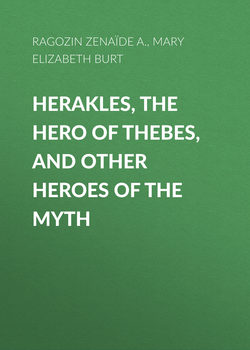Читать книгу Herakles, the Hero of Thebes, and Other Heroes of the Myth - Ragozin Zenaïde A., Zénaïde Ragozin - Страница 7
CHAPTER V
THE THIRD LABOR – THE GOLDEN-HORNED HIND
ОглавлениеThe lower part of Greece is a most peculiar-looking bit of country. You would think it had been torn off from the bulk of the land but kept hanging on to it by a small narrow strip. Then, too, its shape is so queer that it has been compared to all sorts of things; sometimes to a mulberry leaf, sometimes to an open hand.
If we keep to the latter comparison, we will find that the part which answers to the palm of the hand is a large and intricate knot of high wooded mountains which shoot out spurs in all directions. These spurs with the land attached to them stretch out into the sea as so many small peninsulas and not badly represent the fingers of the hand. The central knot of mountains is even now different from the country all around.
The people there are wilder, very much given to robbery and violence and very slow to accept new ways of life or improvements of any kind. In the old heroic times of several thousand years ago that country was simply an impassable wilderness.
It was overcrowded with wild beasts, among which the bear must have been the most plentiful since the land was named after him, Arcadia – the land of Bears. Wolves were known also to abound.
The men who had their villages in the narrow valleys by the mountain-streams were fierce and lawless. There was nothing for them to do but to keep goats and hunt all day long. Arcadia was truly the paradise of hunters and therefore held as specially sacred to the beautiful huntress, the goddess, Artemis – the Lady of the Chase. She roamed over hills and valleys and through woods and groves by moonlight to protect the herds and flocks, this beautiful daughter of Zeus.
In these same mountains of Arcadia there roamed a lovely Hind sacred to Queen Artemis, who gave her golden horns so that she might be known from other deer by the huntsmen. Thus they might be saved from the crime of slaying what was sacred to the gods. Eurystheus ordered Herakles to bring him the Hind alive, for he did not dare to have her killed.
Herakles spent a whole year seeking her from the mountain-tops down to the valleys, through tangles of brush, over streams and in forests, but he was not able to catch her. After a long chase he forced her at last to take refuge on the side of a mountain and from that place to go down to a river to drink.
In order that he might prevent the deer from crossing the water, Herakles was obliged slightly to wound one of her legs. Not till then was he able to secure his game and carry it to Eurystheus.
On his way to Mykenæ Herakles was met by Artemis, who upbraided him for having captured the Hind belonging to her. Herakles made answer: “Great Goddess, if I have chased and caught thy deer, I did it out of necessity, not impiety; for thou well knowest that the gods ordered me to be a servant to Eurystheus and he commanded me to catch the Hind.”
With these words he soothed the anger of the goddess and brought the golden-horned Hind to Mykenæ.
